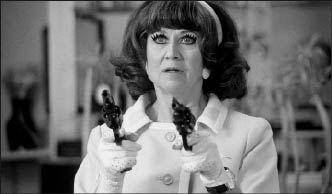From Divine to De Sica?
by George Sax

In a recent interview, the eminent, and eminently unorthodox, Spanish film director Pedro Almodovar divulged that while good-taste-busting American filmmaker John Waters has been an influence on him, in his new film, Volver, he harks back to a decidedly surprising historical body of work: The severe, socially conscious neo-realist work of Italian directors like Roberto Rossellini. Who knew!
Actually, very few can know at present, because Volver hasn’t been released yet, but it has been repeatedly noted in recent years that Almodovar, long a crowned prince of gayly abandoned—in more than one sense, of course—sensibility, had turned serious. His recent films have been called, somewhat euphemistically, “mature.” Certainly, the madcap subversion of social hierarchies and gender definitions was damped down.
The national, eight-film, month-long retrospective of Almodovar’s work that opens here this week at the Market Arcade Film and Arts Center presents us with a very unusual opportunity to take stock of his achievement. (Volver is premiering at the New York Film Festival in October.)
One current of change in that work has been the writer-director’s presentation of women. They have always elicited a kind of out-of-left-field admiration in his film, but his approach did become more serious over the years. Manuela (Cecilia Roth) in All About My Mother, from 1999, takes a journey into her past after the grievous loss of her son, seeking the helping professions’ widely recommended “closure.” What she finds, and recreates, is ironically different, and probably more hopeful, than she and we may have expected.
Hope isn’t really what Almodovar has in mind in Bad Education (2004). It’s a curious, cool, rather emotionally distanced and disturbing film, particularly from this filmmaker. This isn’t just because the amused patience that could often be discerned in his earlier films is missing.
Bad Education was initially connected to the Catholic Church’s then-exploding sexual exploitation scandal. But it also contained a barely obscured subtext that seemed to call into question the practical possibilities of sustaining a mutual devotion between two boys. This bleak tone marked a film-noirish story about the destructive effects of a basely motivated, unscrupulous priest’s conduct on a boy’s life. Coming from the world’s most prominent gay film director, this was at least a little disconcerting.
The younger, more wickedly amusing Almodovar was working out of the surge of expression and defiance of ancient traditions that followed the end of the social repression and intimidating autocracy of the long-ruling Franco dictatorship. In films like 1988’s Matador and 1983’s Dark Habits, there was a camped-up satire on Church rituals and rules. These 1980s and early 1990s films coincided with a growing and franker homoeroticism in European film.
Sony Classics’ program offers a remarkable opportunity for audiences. Studios usually confine such collections to their home video divisions. (While this program continues, these eight films are being withdrawn from the video market.)
Almodovar’s reputation is on the ascendance, and he may or may not be planning an American directorial debut (depending on whose speculation is thought to be persuasive). Whether or not he ever makes an American film, this series presents filmgoers with a virtually unprecedented possibility to review this unusual career. The films have been wisely selected. Catching even one you’re unfamiliar with would be a wise choice.
|
Issue Navigation> Issue Index > v5n37: Curtain Up! (9/14/06) > Film Reviews > From Divine to De Sica? This Week's Issue • Artvoice Daily • Artvoice TV • Events Calendar • Classifieds |









 Current Issue
Current Issue